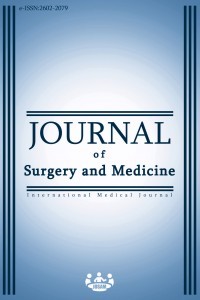Mide kanserinde sağkalımı tahmin etmek: 102 hasta ile prospektif kohort çalışma
Mide kanseri, Sağkalım, Hastalığın seyri
Predicting survival in gastric cancer: A prospective cohort study with 102 patients
Gastric cancer, Survival, Course of disease,
___
- 1. Al-Refaic WB, Abdalla EK, Ahmed SA, Mansfield PF. Gastric cancer. In: Feig BW, Berger DH,Fuhrman GM, editors. M.D. Anderson Hand Book of Surgical Oncology. Philadelphia: LippincottWilliams & Wilkins; 2006 p.205-240.
- 2. Catalano V, Labianca R, Beretta GD, Gatta G, de Braud F, Van Cutsem E. Gastric cancer. Crit Rev Oncol Hematol. 2005;54:209-41.
- 3. Faraji EI, Frank BB. Multifocal atrophic gastritis and gastric carcinoma. Gastroenterol Clin North. Am Gastroenterology. 2002;31:499-516.
- 4. Suehiro T, Hirashita T, Araki S, Matsumata T, Tsutsumi S, Mochiki E, et al. Prolonged antibiotic prophylaxis longer than 24 hours does not decrease surgical site infection afterelective gastric and colorectal surgery. Hepatogastroenterology. 2008;55:1636-9.
- 5. Wang X, Wan F, Pan J, Yu GZ, Chen Y, Wang JJ. Tumor size: a non-neglectable independent prognostic factor for gastric cancer. J Surg Oncol. 2008;97:236-40.
- 6. Saito H, Fukumoto Y, Osaki T, Fukuda K, Tatebe S, Tsujitani S, et al. Prognostic Significance of level and number lymph node metastasis in patiens with gastric cancer. Ann Surg Oncol. 2007;14:1688-93.
- 7. Vasilescu C, Herlea V, Tidor S, Ivanov B, Stănciulea O, Mănuc M, et al. D2 lymph node dissection in gastric cancer surgery: long term results--analysis of an experience with 227 patients. Chirurgia (Bucur). 2006;101:375-84.
- 8. Wu MH, Lin MT, Chen WJ. Effect of perioperative parenteral nutritional support for gastric cancer patients undergoing gastrectomy. Hepatogastroenterology. 2008;55:799-802.
- 9. Huang CM, Lin BJ, Lu HS, Zhang XF, Li P, Xie JW. Prognostic impact of metastatic lymph node ratio in advanced gastric cancer from cardia and fundus. World J Gastroenterol. 2008;14:4383-8.
- 10. Know Sj, Kim GS. Prognostic Significance of Lymph Node Metastasis in Advanced Carcinoma of the Stomach. Br J Surg. 1996; 83:1600-3.
- 11. Bozetti F, Marubini E, Bonfanti G. Subtotal versus total gastrectomy for gastric cancer: Five year survival rates in a multicenter randomized Italian trial. Ann Surg. 1999;230:170-8.
- 12. Stewert JR, Bottcher K, Stein HJ, Roder JD. Relevant prognostic factors in gastric cancer. Ten-year results of the German gastric cancer Study. Ann Surg. 1998;228:449-61.
- 13. Sankaranarayanan R. Screening for cancer in low- and middle-income countries. Ann Glob Health. 2014;80:412–7.
- 14. Fock KM. Review article: the epidemiology and prevention of gastric cancer. Aliment Pharmacol Ther. 2014;40:250–60.
- 15. Mita MT, Marchesi F, Cecchini S, Tartamella F, Ricco' M, Abongwa HK, et al. Prognostic assessment of gastric cancer: retrospective analysis of two decades. Acta Biomed. 2016; 87:205-11.
- 16. Çelen S, Günseren KÖ, Özlülerden Y, Mete A, Tuncay ÖL, Yavaşcaoğlu İ. Does neutrophil-lymphocyte ratio show recurrence in patients who underwent curative resection for non-muscle-invasive bladder cancer? J Surg Med. 2019;3(4):324-7.
- 17. Tekeşin K, Şişik A. Incidental gallbladder cancer: Review of 3856 cholecystectomies. J Surg Med. 2018;2(2):127-9.
- 18. Kalcan S, Sisik A, Basak F, Hasbahceci M, Kilic A, Kosmaz K, et al. Evaluating factors affecting survival in colon and rectum cancer: A prospective cohort study with 161 patients. J Cancer Res Ther. 2018 Jan-Mar;14(2):416-20. doi: 10.4103/0973-1482.199390.
- 19. Shiraishi N, Sato K, Yasuda K, Inomata M, Kitano S. Multivariate prognostic study on large gastric cancer. J Surg Oncol. 2007;96:14-8.
- Başlangıç: 2017
- Yayıncı: Selçuk BAŞAK
Septoplasti sonrası nazal septal perforasyonlardaki risk faktörleri
Erkan YILDIZ, Şahin ULU, Orhan Kemal KAHVECİ
Kril yağının deneysel priapizm modelinde iskemik reperfüzyon hasarı üzerine koruyucu etkileri
Engin KÖLÜKÇÜ, Nihat ULUOCAK, Velid UNSAL
Nadir bir inguinal herniasyon nedeni olan inguinal mesane fıtığı: İki olgu sunumu
Zabeirou Oudou ALİOU, Tenkorang SOMUAH, Belhaj ANAS, Aissaoui ALAE EDDİNE, Souiki TAREK, Farih MOULAY HASSAN, İbn Majdoub KARİM, Toughrai IMANE, Mazaz KHALİD
Lokal anestezik toksisitesinin yönetimi ve lipid infüzyonunun önemi
Serhat ÖZÇELİK, Mehmet ÇELİK, Melike ÖZÇELİK
Kalsiyum değerleri ve otoskleroz arasında bir ilişki var mı?
Erkan YILDIZ, Orhan Kemal KAHVECİ, Şahin ULU, Halit Buğra KOCA
Özgur Ömer YILDIZ, İlknur AYTEKİN ÇELİK
Zabeirou Oudou ALİOU, Badri MOURAD, Souiki TAREK, İbn Majdoub KARİM, Toughrai IMANE, Mazaz KHALİD
